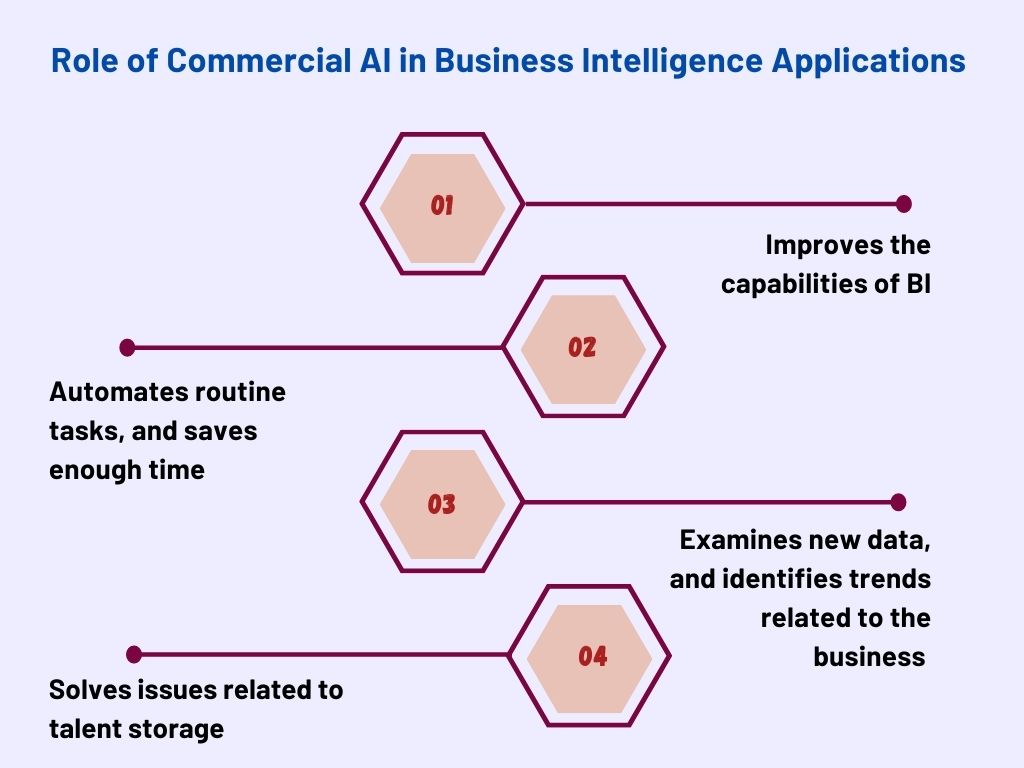The Rise of Commercial Artificial Intelligence in BI
Even as global businesses continue to embrace big data and data analytics, the challenge many faces is: how to derive the most value from the big data.
The latter refers to very large sets of data that cannot be handled with traditional methods.
With artificial intelligence (AI) & its subset machine learning (ML) becoming mainstream, i.e. moving from the laboratory to the commercial market, one option companies today have to handle their voluminous data is machine learning.
Analytics has moved on from traditional methods to automated solutions for better business intelligence. In fact, it’s gone beyond the scope of a standalone human analyst.
ML-based algorithms thrive on big data – both structured & unstructured – so using ML for analytics helps companies maximize their big data potential.
Companies can now use ML to ingest and identify data across marketing & sales to:
- Identify trends
- Get insights into vast reams of data
- Make faster business decisions
Enhance Your Business Efficiency with Our BI Professionals
But how do you leverage the combination of big data and ML to glean business insights?
Machine learning-based big data analytics can decipher the data by unveiling patterns and forecasting trends.
ML-based algorithms can classify the data, recognize patterns & interpret the data into business insights. That’s how they are of value in business intelligence.
How is ML-Based Business Intelligence (BI) Implemented
First & foremost, a business cannot just add ML to the top layer of its IT stack or BI operations & think the job is done.
ML-based algorithms, useful for gathering, analyzing, and integrating data, must be executed across all aspects of the business operation. Here let’s not forget the way ML works.
Data scientists train the “machines” by providing them with continuous datasets to observe & analyze to help them improve over time.
They rely on data models that include disciplines like data labeling, segmentation & analytics.
Benefits of Machine Learning in Big Data Analytics
Big data analytics can lead to major cost reduction, saving of time, and a decrease in risk in business decision-making.
Looking for patterns: The most important benefit of ML in data analytics is the ability to recognize patterns within the data.
ML can be very efficient in decoding patterns within large volume data sets, something that’s impossible for humans.
In retail, for example, this can be a big help as it helps in understanding consumer patterns.
ML-based analytics can help better service customers by throwing up offers in advance, based on their previous buying patterns.
Predicting the future: At the same time, machine learning in big data helps forecast future trends in the market.
For example, using predictive analytics, if a smartphone manufacturer can scientifically analyze the likely demand of a dual-screen phone in the next year, it can then predict future sales, based on which, it can manufacture x amounts of handsets.
Predictive analytics: ML in data analytics helps companies understand almost to a degree of accuracy, what their customers want.
It allows the calculation of the probabilities of various outcomes.
This can be useful for cross-selling and upselling products or calculating the chances of the efficacy of a certain treatment for a patient.
Enhance Your Business Efficiency with Our BI Professionals
Customer segmentation: In today’s world of cut-throat competition, every business must understand the audience to target them effectively.
Machine learning uses data to classify customers and to interpret consumer patterns and behaviors.
This system of machine learning is known as user modeling. ML-based algorithms mine data to understand the profile of the customers to help businesses make intelligent decisions.
An Engine That Drives Customer Intelligence
Oyster is not just a customer data platform (CDP). It is the world’s first customer insights platform (CIP). Why? At its core is your customer. Oyster is a “data unifying software
Liked This Article?
Gain more insights, case studies, information on our product, customer data platform


